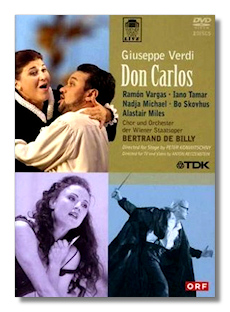
The Internet's Premier Classical Music Source
Related Links
- Verdi Reviews
- Latest Reviews
- More Reviews
-
By Composer
-
Collections
DVD & Blu-ray
Books
Concert Reviews
Articles/Interviews
Software
Audio
Search Amazon
Recommended Links
Site News
 DVD Review
DVD Review
Giuseppe Verdi

Don Carlos
- Ramón Vargas (Don Carlos)
- Iano Tamar (Elisabeth de Valois)
- Nadja Michael (La princesse Eboli)
- Bo Skovhus (Rodrigue)
- Alastair Miles (Philippe II)
- Simon Yang (Le Grand Inquisiteur)
- Dan Paul Dumitrescu (Un moine)
Orchestra and Chorus of the Vienna State Opera/Bertrand de Billy
TDK DVWW-OPCARLOS 2DVDs 247:00 Dolby Digital DTS LPCM Stereo Widescreen Anamorphic
Verdi's later operas frequently play with the contrasts between the public and the private. Aïda alternates imposing crowd scenes with tense confrontations among the main characters, and La forza del destino is even more sweeping – almost cinematic. Director Peter Konwitschny takes the contrast between the public and the private to new extremes in his Don Carlos, staged at the Vienna Staatsoper in fall 2004. Konwitschy has the reputation of being a "bad boy" director – for his example, his Lohengrin moves the opera's action into a schoolroom – and I know that many people were scandalized by what he does with (or to) Don Carlos. Although the director frequently and blatantly goes against the libretto, the opera's spirit remains intact, and – in my opinion – glows even more brightly with the new lights that Konwitschny shines upon it.
The set design is Spartan. Most of the action takes place inside a giant white cube, featureless, except for doors that open into the wings. This emphasizes the emotional claustrophobia experienced by the main characters. The cube is absent at telling moments, though: (1) in the Fontainebleau act (not cut here, obviously), when Carlos and Elisabeth still have a chance at happiness; (2) in the act III ballet, which here is called "Eboli's Dream" (more on that anon); (3) in the auto-da-fé (ditto); and (4) at the very end of the opera, when the Monk/Charles V appears to rescue Carlos.
The costumes generally suggest the appropriate time period, but during the aforementioned ballet, Eboli dreams that she is a middle-class housewife from the 1950s, married to Carlos, and celebrating her pregnancy by having Philippe and Elisabeth over for a roast turkey. When she accidentally burns the turkey, they order pizza, which is delivered by Rodrique from "Posa's Pizza"! Hilarity ensues. The sheer banality of this sequence points up the idea that Don Carlos is a domestic drama – an opera with more than its share of soap. But then, Konwitschy goes to the other extreme and turns the auto-da-fé into an international media event, not just on the stage but in the auditorium, and even on the steps of the Staatsoper. When Philippe makes his glitzy entrance into the auditorium, surrounded by bodyguards in dark sunglasses, we hear booing, and for a moment we are not sure who is being booed – Philippe or Konwitschny? The fourth wall has been ripped away. As for the auto-da-fé itself, no one in the bored stage audience really seems to care about some old heretics until Carlos shows up and tries to take over the media event for his own purposes, scattering photos of what appears to be the Holocaust. It's a particularly daring moment in what is, overall, a daring (but not self-indulgent) production.
As you've probably gathered already, this production is sung in the original French, which softens the outlines of Verdi's music. By the same token, the singing in this production is never larger-than-life, but very human, and even vulnerable. All of it is pleasing, and none of it will go down in the history books as definitive. In fact, if I attended this production with my eyes closed, I might be disappointed, but together, the singing, the acting, and the direction create a synergy, and everything works. Vargas, like Plácido Domingo before him, gives us a Carlos with a gleaming, heroic tone and Latin temperament. Tamar brings a Verdi-ready voice to Elisabeth, but her singing generalizes the character's suffering, royalty, and faith. As Eboli, Michael is quite the looker, and the Veil Song is terrifically sexy. "O don fatale" (here, "Ô don fatal") feels a size too big for her, though. Miles's Philippe is bit light-voiced too, and not so very regal, but quite sympathetic. Skovhus, wearing nerd-chic glasses throughout, is a sonorous Rodrigue whose voice nevertheless loses body lower in his range. Konwitschny's direction makes Rodrigue an even more important figure than ever – he's the pivot on which the action in this opera turns. Furthermore, he cannot keep his hands off of Carlos, who balks at Rodrigue's attempts at hand-holding, even in the death scene. In fact, when Rodrigue is shot, he literally uses his last breaths to crawl right on top of the Carlos, who is so horrified that he is practically sucking his thumb. In the orchestra, the Vienna brass in particular prove their mettle, and the chorus does excellent work. Bertrand de Billy's conducting is broad, but never lacking in tension and nuance.
No complaints about the way that all of this has transferred to DVD, except it is a little hard to see what is going on the during the first part of Fontainebleau act. The English subtitles are good.
At over four hours, Don Carlos is a long opera, and it's wonderful to be able to watch it at home, particularly in a production that so many people have been discussing!
Copyright © 2008, Raymond Tuttle




















